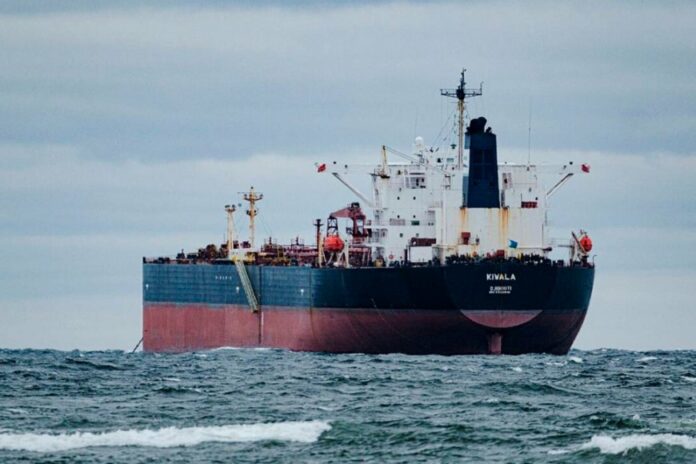The Estonian Navy has detained the oil tanker Kiwala, which is believed to be part of Russia’s so-called shadow fleet.
The detention was confirmed by Commodore Ivo Värk, commander of the Estonian Navy, according to national broadcaster ERR.
The vessel was stopped early on Friday, April 11, to verify its documentation, legal status, and compliance with safety regulations.
“It’s no secret that many undocumented vessels have appeared in the Gulf of Finland over the past year. We can safely say they are part of the shadow fleet,” said Veiko Kommusaar, head of the border guard division of the Police and Border Guard Board.
Estonia began preparations to intercept the vessel on Thursday evening. The operation started at 3 a.m. local time, and by 4:19 a.m., the Kiwala had entered Estonian territorial waters.
The tanker was en route from the Indian port of Sikka to the Russian port of Ust-Luga. It is subject to sanctions imposed by the United Kingdom, Canada and the European Union due to previous violations.
“The vessel was sailing without a flag. Vessels without flags are effectively stateless and should not be in operation. Estonia exercised its right to detain it for inspection,” Kommusaar explained.
During the detention, Estonia’s Transport Department is inspecting the ship’s technical condition, its insurance coverage, and the documentation of its 24-member crew. The ship’s captain is a Chinese national.
According to Ukrainian website WarSanctions, the Kiwala is used to transport crude oil and petroleum products from Russia to third countries. The website reports that ownership and management of the ship have changed frequently in an effort to obscure its Russian ties and the identities of end recipients.
Andrii Klymenko, editor-in-chief of Black Sea News and project manager at the Black Sea Institute for Strategic Studies, told Militarnyi that the Baltic states were seeking legal means to counter Russia’s shadow fleet, which operated close to their coastlines.
These ships carry large volumes of Russian oil and petroleum products from Russian ports in the Baltics, generating revenue that helps finance the war in Ukraine. Klymenko added that the poor condition of those tankers posed an environmental risk in case of an accident.
He said the immediate reason for the Kiwala’s detention likely stemmed from its status in the Equasis maritime database—an official resource of the European Commission and France’s maritime authority. The tanker (IMO n° 9332810) is listed with a flag entry reading “Djibouti False – false flag” and an “UNKNOWN” entry in the call sign column.
According to the editor-in-chief of Black Sea News, the sanctions imposed on this vessel do not grant the right to detain it, even in territorial waters, as they only prohibit port entry. Therefore, Klymenko said it was necessary to add a provision to the sanctions regimes introduced by Western countries against Russia’s “shadow fleet.”
Source: Militarnyi



